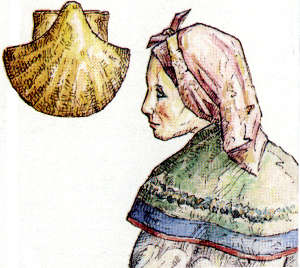Baralla Galega
'Baralla Galega' designed by X. Cobas and published by Imprenta Comercial Imprent S.A., La Coruña (Spain) in 1983

Baralla Galega
'Baralla Galega' was designed by X. Cobas and published by Imprenta Comercial Imprent S.A., La Coruña (Spain) in 1983. The design of the cards is based on the folk traditions, symbolic objects and regional dress of Galician people in northwest Spain. Galicia is an autonomous region in Spain and has its own official language. A revival of Galician language and culture has been taking place and tourism improves the region's economic outlook. The scallop shell, or concha de vieira in the Galician language, became associated with the pilgrimage to Santiago.

The suit symbols are Scallop Shells, Baskets, the Cross of St. James and Staves. The 'Jacks' are female; Cavaliers or Knights are horse's heads and the Kings are elder men seated on gilded chairs. See also: Baraja Gallega →


Above: 'Baralla Galega' was designed by X. Cobas, whose signature appears on the Ace of Clubs, and published by Imprenta Comercial Imprent S.A., La Coruña (Spain) in 1983. The reverse has an advertisement for a dairy cooperative. 40 cards in box.

By Simon Wintle
Member since February 01, 1996
I am the founder of The World of Playing Cards (est. 1996), a website dedicated to the history, artistry and cultural significance of playing cards and tarot. Over the years I have researched various areas of the subject, acquired and traded collections and contributed as a committee member of the IPCS and graphics editor of The Playing-Card journal. Having lived in Chile, England, Wales, and now Spain, these experiences have shaped my work and passion for playing cards. Amongst my achievements is producing a limited-edition replica of a 17th-century English pack using woodblocks and stencils—a labour of love. Today, the World of Playing Cards is a global collaborative project, with my son Adam serving as the technical driving force behind its development. His innovative efforts have helped shape the site into the thriving hub it is today. You are warmly invited to become a contributor and share your enthusiasm.
Related Articles

Tarot de las Coscojas
Historical playing card design, tarot symbolism and an almost psychedelic medieval surrealism.

Tarot de Valverde de la Vera
A series of 24 surrealist engravings by Mexican artist Claudio Favier in which archetypal Tarot alle...

Kazakh Tales
Bold designs by K.K. Karpun and S. Nukenov inspired by Kazakh folk tales.

Baraja de Juan Martín Zamorano
Deck inspired by El Pendón de los Zamorano, a military pennant dating from 1501, published by Priego...

Heráldica Castanyer No. 16
Strange variant of international pattern cards for poker or bridge.

Mexican ethnic playing cards
Mexican ethnic groups depicted on playing cards by Fábrica de Naipes Cuauhtemoc.

Seminole Wars deck
Seminole Wars deck by J. Y. Humphreys, Philadelphia, c.1819.

Fantasy Spanish-suited deck
Fantasy Spanish-suited deck by Bertschinger y Codina, Barcelona.

Bertschinger y Codina - Cartes Françaises
French ‘Paris’ pattern made by Bertschinger y Codina, Barcelona, c.1850.

Braulio Fournier
Baraja Nº 1 produced by Braulio Fournier, Burgos, c.1868.

Pirritx eta Porrotx
Happy Families card game from the Spanish Basque Country.

Naipe Vizcaino
‘Naipe Vizcaino’ designed by Javier Urkiri and published by Industrias Gráficas Castuera and the Caj...

Baraja Turística del País Vasco
Basque poker deck of 55 cards published by Fournier with scenic views of the Basque Country.

Baraja Vasca
Spanish Basque Country deck with original drawings by María Isabel Ibañez de Sendadiano.

Czech Bohemian style playing cards
Czech Bohemian style playing cards with a charming aesthetic, reflecting the cultural and social lif...

Baraja Cultura Española
ASESCOIN pack for 2022 designed by M.A. Corella featuring famous Spaniards and notable buildings.
Most Popular
Our top articles from the past 28 days

